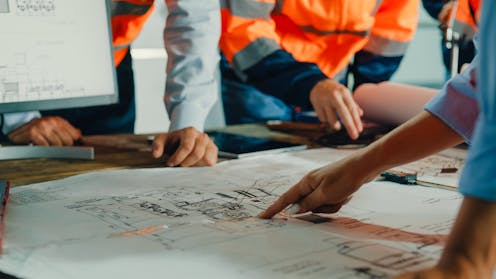
Hyundai Motor Group Executive Chair Chung Euisun, center, accompanied by U.S. President Donald Trump, shares the carmaker's multibillion-dollar investment plan at the White House in Washington, Monday (local time). AP-Yonhap
Carmaker wins exemption from tariffs in US: Trump
By Lee Min-hyung
Hyundai Motor Group unveiled a $21 billion (31 trillion won) investment plan in the United States on Monday, covering various aspects such as production lines for vehicles, auto parts and steel through 2028.
This marks the first time a Korean company has announced such a large-scale investment initiative since U.S. President Donald Trump took office in January.
Hyundai Motor Group Executive Chair Chung Euisun made the announcement at the White House, where he was accompanied by Trump.
“I am pleased to announce an additional $21 billion in new investments over the next four years — our largest U.S. investment ever,” Chung said. “A key part of this commitment is our $6 billion investment to strengthen the U.S. supply chain from steel and parts to automobiles.”
In particular, the carmaker will allocate $8.6 billion to building vehicle production infrastructure. Under the plan, the company aims to expand its annual production by more than 1.2 million cars.
The initiative will pick up steam after the planned opening of its long-awaited Hyundai Motor Group Metaplant America in Georgia. The facility is capable of manufacturing up to 500,000 vehicles with a focus on hybrids and electric vehicles.

Hyundai Motor Group Executive Chair Chung Euisun, left, listens as U.S. President Donald Trump speaks in the Roosevelt Room of the White House in Washington, Monday (local time). From left are Chung, Hyundai Motor Group Vice Chair Chang Jae-hoon, Hyundai Motor President Sung Kim and Hyundai Steel CEO Seo Gang-hyun. AFP-Yonhap
The group’s steelmaking arm, Hyundai Steel, also announced plans to build an electric arc furnace steel mill in the U.S. state of Louisiana. The mill will serve as the base for producing automotive steel plates, with the facility set to start operating in 2029.
Chung highlighted the company's multibillion-dollar investment in the steelmaking facility, which he said will create 1,300 American jobs. The group will spend $6.1 billion in builidng the mill and localizing production of other parts for vehicles.
“The facility will also serve as the foundation for a more self-reliant and secure automotive supply chain in the U.S.,” he said.
Trump also welcomed the investment by the Korean carmaker, saying the company will be exempted from upcoming tariffs.
“Hyundai will be producing steel in America, and making its cars in America — as a result, they will not have to pay any tariffs,” Trump said.
The Trump administration is set to impose a 25 percent tariff on cars imported into the world’s largest economy starting April 2. As Hyundai Motor Group’s reliance on U.S. sales continues to grow, there are concerns that Hyundai Motor and Kia could be among the Korean companies hit hardest by tariffs.
Along with the carmaker’s surprising announcement at the White House, the company is also scheduled to hold a special event on Wednesday (local time) to celebrate the opening of its $8 billion automotive plant in Georgia.

U.S. President Donald Trump, flanked by Speaker of the House Mike Johnson, left, and Louisiana Gov. Jeff Landry, right, speaks in the Roosevelt Room of the White House in Washington, Monday (local time). Also pictured are Hyundai Motor Group Executive Chair Chung Euisun, second from right, and Hyundai Motor Group Vice Chair Chang Jae-hoon, right. AFP-Yonhap
The carmaker will also execute a budget of $6.3 billion in future mobility and energy. Under the initiative, the company will strengthen ties with U.S. firms in more areas such as autonomous driving, robots, artificial intelligence and advanced air mobility.
Experts lauded the company for providing an exemplary case for Korean firms to deal with trade pressure from the U.S.
Lee Ho-geun, an automotive engineering professor at Daeduk University, praised Hyundai Motor Group's decision not to escalate the conflict by bringing the tariff issue to international trade authorities.
“Trump’s upcoming auto tariff is seen as a clear violation of the Korea-U.S. Free Trade Agreement (KORUS FTA), but the carmaker decided not to escalate any dispute with the country due to its massive repercussions,” Lee said.
“The carmaker will end up suffering damages in terms of administrative costs, sales and corporate image when taking any legal actions against the U.S., so the latest investment looks desirable."

Hyundai Motor Group Executive Chair Chung Euisun speaks in the Roosevelt Room at the White House in Washington, Monday (local time). UPI-Yonhap
SK Securities analyst Yoon Hyuk-jin said Hyundai Motor and Kia made their latest decision based on profitability, opting to avoid unexpected tariff-related expenses during the Trump presidency.
“The two carmakers' combined revenue is expected to drop by up to 10 trillion won annually once the 25 percent tariff takes effect. It seems they have chosen to increase investment rather than bear the cost of the tariff,” the analyst said.
Kim Pil-soo, an automotive technology professor at Daelim University College, also praised Hyundai Motor Group's investment, noting that it has made a positive impression on both Korean companies and the Trump administration.
“Hyundai Motor Group created a positive image with this decision at a critical time when Trump is intensifying trade pressure on local companies,” he said. “The carmaker has set a strong example for other Korean firms to follow in the future.”
Shares of Hyundai Motor and Kia closed with gains of 3.29 percent and 2.13 percent, respectively, on the benchmark KOSPI, despite the overall lackluster performance of the main bourse.


















 English (United States) ·
English (United States) ·